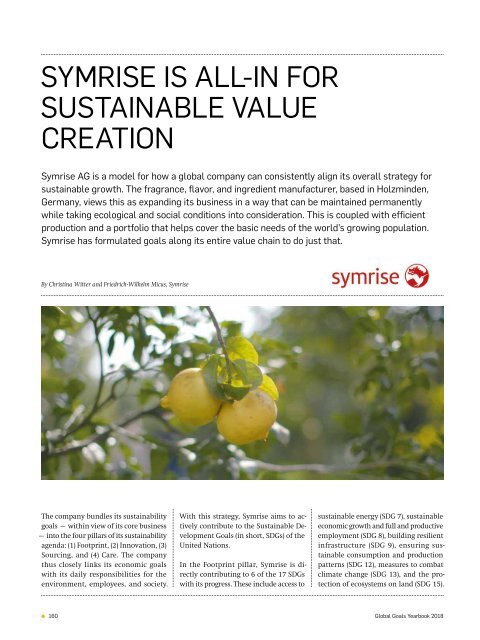Global Goals Yearbook 2018
The future of the United Nations is more uncertain than at any time before. Like his predecessors, UN Secretary General, Antonio Guterres, has promised to reform the United Nations. Drivers are two major agreements: The 2030 Agenda for Sustainable Development and the Paris Climate Accord. Both stand for a move away from statal top-down multilateralism towards new form of partnership between the public and the private sector as well as the civil society. The Global Goals Yearbook, published under the auspices of the macondo foundation, therefore covers „Partnership for the Goals“ as its 2018 main topic. Our world is truly not sustainable at this time. To make the 2030 Agenda for Sustainable Development a success story, we need an enormous increase in effort. This cannot happen without help from the private sector. But businesses need a reason to contribute as well as attractive partnerships that are based on win-win constellations. We have no alternative but to rethink the role that public–private partnerships can play in this effort. That is why United Nations Secretary-General António Guterres is calling upon UN entities to strengthen and better align their private-sector engagement. In every change there is a new chance. The Global Goals Yearbook 2018 discusses the multiple aspects of how private sector engagement can be improved. Recommendations are, among others, to revise multilaterism, partnership models and processes and to invest more in trust, a failure culture as well as metrics and monitoring. When businesses engage in partnerships for the Goals, this is more than just signing checks. It means inserting the “do good” imperative of the SDGs into corporate culture, business cases, innovation cycles, investor relationships, and, of course, the daily management processes and (extra-)financial reporting. The Yearbook includes arguments from academic and business experts, the World Bank and the Club of Rome as well as UN entities, among them UNDP, UNSSC, UNOPS, UN JIU, and UN DESA.
The future of the United Nations is more uncertain than at any time before. Like his predecessors, UN Secretary General, Antonio Guterres, has promised to reform the United Nations. Drivers are two major agreements: The 2030 Agenda for Sustainable Development and the Paris Climate Accord. Both stand for a move away from statal top-down multilateralism towards new form of partnership between the public and the private sector as well as the civil society. The Global Goals Yearbook, published under the auspices of the macondo foundation, therefore covers „Partnership for the Goals“ as its 2018 main topic.
Our world is truly not sustainable at this time. To make the 2030 Agenda for Sustainable Development a success story, we need an enormous increase in effort. This cannot happen without help from the private sector. But businesses need a reason to contribute as well as attractive partnerships that are based on win-win constellations.
We have no alternative but to rethink the role that public–private partnerships can play in this effort. That is why United Nations Secretary-General António Guterres is calling upon UN entities to strengthen and better align their private-sector engagement. In every change there is a new chance.
The Global Goals Yearbook 2018 discusses the multiple aspects of how private sector engagement can be improved. Recommendations are, among others, to revise multilaterism, partnership models and processes and to invest more in trust, a failure culture as well as metrics and monitoring.
When businesses engage in partnerships for the Goals, this is more than just signing checks. It means inserting the “do good” imperative of the SDGs into corporate culture, business cases, innovation cycles, investor relationships, and, of course, the daily management processes and (extra-)financial reporting.
The Yearbook includes arguments from academic and business experts, the World Bank and the Club of Rome as well as UN entities, among them UNDP, UNSSC, UNOPS, UN JIU, and UN DESA.
You also want an ePaper? Increase the reach of your titles
YUMPU automatically turns print PDFs into web optimized ePapers that Google loves.
SYMRISE IS ALL-IN FOR<br />
SUSTAINABLE VALUE<br />
CREATION<br />
Symrise AG is a model for how a global company can consistently align its overall strategy for<br />
sustainable growth. The fragrance, flavor, and ingredient manufacturer, based in Holzminden,<br />
Germany, views this as expanding its business in a way that can be maintained permanently<br />
while taking ecological and social conditions into consideration. This is coupled with efficient<br />
production and a portfolio that helps cover the basic needs of the world’s growing population.<br />
Symrise has formulated goals along its entire value chain to do just that.<br />
By Christina Witter and Friedrich-Wilhelm Micus, Symrise<br />
The company bundles its sustainability<br />
goals – within view of its core business<br />
– into the four pillars of its sustainability<br />
agenda: (1) Footprint, (2) Innovation, (3)<br />
Sourcing, and (4) Care. The company<br />
thus closely links its economic goals<br />
with its daily responsibilities for the<br />
environment, employees, and society.<br />
With this strategy, Symrise aims to actively<br />
contribute to the Sustainable Development<br />
<strong>Goals</strong> (in short, SDGs) of the<br />
United Nations.<br />
In the Footprint pillar, Symrise is directly<br />
contributing to 6 of the 17 SDGs<br />
with its progress. These include access to<br />
sustainable energy (SDG 7), sustainable<br />
economic growth and full and productive<br />
employment (SDG 8), building resilient<br />
infrastructure (SDG 9), ensuring sustainable<br />
consumption and production<br />
patterns (SDG 12), measures to combat<br />
climate change (SDG 13), and the protection<br />
of ecosystems on land (SDG 15).<br />
160<br />
<strong>Global</strong> <strong>Goals</strong> <strong>Yearbook</strong> <strong>2018</strong>

















